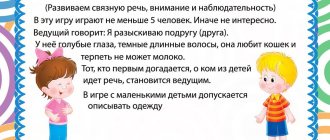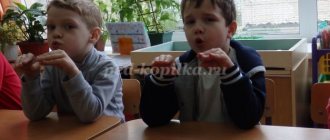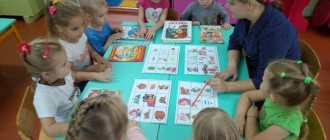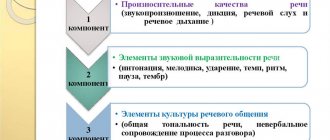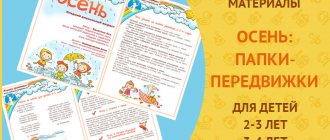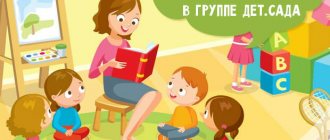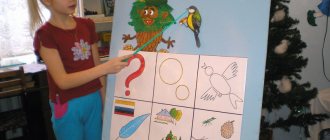One of the indicators of a child’s readiness for successful schooling is correct, well-developed speech. 6 years is a period of extremely intensive development.
Parents do not always attach great importance to the speech development of their children, believing that their kids will learn everything at school. But at school problems begin, since written speech is formed on the basis of oral speech.
Younger schoolchildren write mainly as they speak. If a child says “sapka” instead of “hat,” then most likely he will write it that way.
Naturally, learning to write is based on children’s stable ideas about the order of sounds in a word.
Characteristics of the speech features of older preschoolers
In the senior groups of kindergarten, in the process of speech development in children of senior preschool age, the main attention is paid to the development of monologue and dialogic speech, the formation of speech creativity in children. Classes are aimed at developing expressive speech in preschoolers.
In general, speech readiness for learning at school covers all types of speech activity of an older preschooler.
Now there are a lot of different manuals and other information base on speech development in older preschoolers.
Everywhere you can find various scenarios and lesson notes on this topic. It would seem, what else is there to talk about? But every year you become convinced that there are fewer and fewer speech-literate first-graders.
It's all because of the media, the computerization of children's minds. This not only does not enrich the speech of a preschool child, but on the contrary spoils the useful “speech norms of etiquette.”
Speech readiness of the child for school. Consultation for kindergarten parents
Speech readiness of children for learning at school.
Consultation for parents. Davidyuk Oksana Nikolaevna Teacher-speech therapist. Place of work: MKDOU kindergarten “Beryozka”, Listvennichny village, Kondinsky district, Khanty-Mansi Autonomous Okrug - Yugra. Purpose: To acquaint parents with the basic prerequisites for speech readiness for school learning. Being ready for school does not mean being able to read, write, and count. To be ready for school means to be ready to learn all this. The transition from preschool childhood to the period of schooling is fraught with many innovations, one of which is the mastery of such a complex skill as writing. How can one determine whether a child is ready to master written language, and what problems lie ahead? What exactly should you pay attention to? First of all, it is necessary to take into account that written speech directly depends on the level of development of oral speech. If there are any deviations in the speech development of a preschooler, then by the beginning of school education it is worth making every effort to overcome them. Every child who enters school, during the years of primary school, must become proficient in literacy, that is, learn to read and write. Correct and sufficiently fluent reading, as well as competent writing, is a necessary condition for the student to master all other school subjects, and therefore for the success of his education in general. Even before learning to read and write, the child must have the necessary prerequisites for this: 1. Full mastery of speech sounds. (slide No. 2 is projected onto the screen)
Normally, the child should fully master the entire sound aspect of speech by 3–4 years of age; by 5–6 years of age, he should be able to differentiate sounds by ear and pronunciation.
When coming to school, the child must clearly pronounce sounds in various words, in phrasal speech. He must not omit them, distort them, or replace them with others. Violation of the sound-pronunciation side of speech can leave its mark on writing skills. If a child distorts or replaces any sounds in oral speech (most often these are whistling, hissing, [р], [р,] [л]), then there is a possibility that in written speech these sounds will also be replaced or omitted. Of course, not all children with impaired sound pronunciation have such problems (omissions and substitutions of letters in writing). If the child has sufficiently well-developed phonemic hearing, then there will be no such difficulties. However, the risk is quite high, and by the time school starts, it is in the interests of parents to make sure that the future first-grader pronounces all sounds clearly. 2.Fully formed phonemic processes. (slide No. 3 is projected onto the screen)
By the beginning of school, the child should have well-developed phonemic hearing - the ability to hear, recognize and distinguish phonemes (sounds) of his native language.
An insufficient level of development or a violation in the development of phonemic hearing in oral speech is manifested in the replacement of one sound with another (for example: instead of “hat” the child says “sapka”), in errors in reproducing words with a complex sound-syllable structure, such as cyclist, scuba diver and so on. At the same time, you should pay attention that if a child, with normal sound pronunciation, confuses sounds in oral speech, then this will be reflected in writing in a similar way. And, of course, if a child has impaired both sound pronunciation and phonemic hearing, the problem becomes even more serious. It is also worth noting that when such errors are fixed in written speech, the work becomes more complicated and it will take much more time to eradicate this defect. To fully master reading and writing, the ability to differentiate speech sounds by ear is not enough; you also need to learn sound analysis and synthesis of words, i.e. The child must be prepared for sound-letter analysis and synthesis of the sound composition of speech: the ability to isolate the initial vowel sound from a word, hear and isolate the first and last consonant sound in a word, determine the number of sounds in a word, etc. In addition, children must know and correctly use the terms “Sound”, “Syllable”, “Word”, “Sentence”, sounds vowel, consonant, voiced, voiceless, hard, soft; be able to work with a word diagram, a split alphabet. So, if a child comes to school not ready for the complex process of sound analysis and word synthesis, then he will inevitably encounter great difficulties. It would seem that what could be simpler: name the sounds that make up the word? I propose to conduct a small experiment: name all the sounds in the word “CAT” in order, tell me, did you imagine the word written or did you pronounce the word before naming the sounds? It should be noted that the one who presented the written word actually carried out not a sound analysis, but a letter analysis. If in doubt, I suggest one more word: “JURA”. What's the first sound? Stop! The sound [yu] does not exist in nature. Listen: y-yay, the first sound in this word is [th]. You see that even for an adult, literate person it is not so easy to simply perform a sound analysis of a word. What is it like for a child? Let's try another little experiment: name words that begin with the same sound as the word “FOX”. (In case: 1. If parents name words starting with a hard sound L
- you did not pay attention to the fact that this first sound is a soft consonant. Therefore, you named both the word “forest” and the word “lamp”. You did not listen to sounds, you thought about the letter. You replaced the sound reality with the letter one and therefore completely lost sight of the softness or hardness of consonant sounds. 2.
If the parents completed the task correctly:
Well done, you coped with the task and took into account the softness and hardness of consonants. Children need this still studying.) Doing a variety of exercises with the child specifically with the sound side of the word.
We imperceptibly introduce the child into the fascinating world of language, discover for him a special linguistic reality and thus lead him, unbeknownst to him, to reading. (slide No. 4 is projected on the screen) - parents are invited to complete practical exercises 3. Adequacy of vocabulary. (slide No. 5 is projected on the screen)
By the age of 7, the child should have a fairly large vocabulary.
In his speech, he must actively use antonyms (sad - cheerful, young - old, high - low, run - stand, talk - be silent, etc.), synonyms (for example, dog, dog, canine; horse, horse, stallion , horse, etc.), words - actions, words - signs. The more vocabulary a child has, the richer, more expressive and more imaginative his own speech will be, and the better he will understand the speech of the people around him. (slide No. 6 is projected on the screen) - parents are invited to complete practical exercises 4. Formation of the grammatical structure of speech. (slide No. 7 is projected on the screen)
The ability to use detailed phrasal speech, the ability to work with sentences;
correctly construct simple sentences, see the connection of words in sentences, extend sentences with secondary and homogeneous members; work with a deformed sentence, independently find errors and eliminate them. By the age of 7, a child should be able to understand various grammatical structures. For example, Dad read the newspaper after he had breakfast. (What did he do first?) The hunter runs after the dog. (Who is running ahead?), etc. And also form words correctly. For example, plum jam is plum, a straw hat is straw, a fox has fox cubs, a lion has cubs, etc. An insufficient level of development of the grammatical structure of speech will lead to errors expressed in the agreement of words in a sentence by gender, number, case ; to inappropriate use of prepositions. Difficulties in mastering the skills of word formation and inflection will provoke the occurrence of errors in those words, for the correct spelling of which it is necessary to select a test word. (slide No. 8 is projected on the screen) - parents are invited to complete practical exercises 5. Proficiency in coherent speech. (slide number 9 is projected onto the screen)
By the age of 7, a child should be able to retell short, unfamiliar stories and fairy tales.
When retelling, attention is paid to the child’s understanding of the text (he must correctly formulate the main idea), to the structuring of the text (he must be able to consistently and accurately construct a retelling), to vocabulary (the complete use of vocabulary - words), to grammar (he must correctly construct sentences, be able to use complex sentences), fluency of speech (lack of prompts during the retelling). (slide number 10 is projected onto the screen) - parents are invited to complete practical exercises.
So, if a child makes agrammatical mistakes in oral speech, this will be reflected in writing. Parents of future first-graders should clearly understand that the process of mastering written language in itself is very difficult for a child, and if there are speech disorders, then the task becomes even more difficult. When dysgraphia (writing impairment) and dyslexia (reading impairment) occur, the child is forced not only to master the curriculum, but also to work to overcome specific errors in writing. Since reading and writing are part of school learning again and almost no lesson is complete without this skill, children suffering from dysgraphia and dyslexia quickly become classed as underachievers. In addition, the child develops a negative attitude toward learning; naturally, low grades and numerous mistakes force the student to “give up” and prevent him from believing in his own capabilities. In order to eradicate dysgraphic errors it takes a lot of time and effort. Thus, it is much easier to prevent this disorder in preschool childhood by promptly paying attention to pathologies in the development of oral speech. When should you start preparing your child for school? What's the best way to do this? What and how to teach? There is no single recipe, and there cannot be: you need to talk more with one, listen to another more, run and jump with a third, and teach a fourth to sit “minute by minute” and work attentively. One thing is clear - you need to prepare your child for school; and everything you teach your child now, and most importantly, what he learns himself, will help him be successful in school.
Presentation on the topic: Speech readiness of a child for learning at school
We recommend watching:
Memo for parents of preschool educational institutions. Signs of a tendency to caries Prevention of road traffic injuries in preschool educational institutions Consultation for parents of children with speech delays Consultation for parents of kindergarten. The role of family relationships in moral formation
Similar articles:
Speech therapy examination upon admission to school
Characteristics of speech disorders in children
In speech activity, most children of senior preschool age are characterized by self-doubt; it is difficult for children to express their thoughts in the correct form. The hooting of parents causes children to begin to distort words, replacing some sounds with others that are more pleasing to the ear.
According to observations, 60% of older preschoolers have frequent violations of grammar and expressiveness of speech. This includes incorrect agreement of words when composing sentences. Even simple sentences can be very distorted. The vocabulary is poor or filled with vocabulary from popular television and computer programs and games.
Although children will master the basics of literacy only during school, nevertheless, in kindergarten it is already necessary to conduct special speech classes. Then at school it will be easier for children to learn the norms of the language. Important areas in speech activity are phonetics, vocabulary, grammar, and the ability to speak coherently when constructing small dialogues and short monologues.
Characteristics of children with developed speech
Children with developed speech usually have a high level of intellectual and social development.
Let's consider the main directions of speech readiness of preschoolers for school.
Sound speech culture must be sufficiently formed. Children of senior preschool age must have clear diction and good sound pronunciation.
The vocabulary of older preschoolers should be enriched and activated by various words and phrases. This will help children communicate with others.
The grammatical structure and expressive features of speech of older preschoolers are mastered and used through the formation of new words, when a preschool child learns to change words morphologically, change the case of words, and compare adjectives. Use all degrees of comparison of adjectives and adverbs.
Coherent children's speech, which includes dialogical statements and monologues, presupposes the development in children of the ability to independently construct correct statements. These should be different sentences: reasoning, narration, description. Such skills are successfully developed when the child listens carefully to the statements of others, then repeats the sentences. It’s good when the interlocutor is literate, then the child will be presented with the correct speech samples.
By the sixth year of life, a preschooler improves all aspects of speech activity. Possesses coherent and expressive speech. In communication, the senior preschooler answers questions clearly and has a large vocabulary. This is ideal. If this is not the case, then you need to sound the alarm. And as soon as possible, before the child goes to school, targeted speech correction needs to be carried out.
Lexicon
The child must have a fairly well developed vocabulary, he must be oriented in the generic and specific relationships of objects:
— it is correct to classify individual objects into one or another group of objects (sofa-furniture, boletus-mushroom, violet-houseplant, mechanic-profession...)
- be able to define an object through a generic name and a specific concept: a sugar bowl is a container in which sugar is located... Cuts vegetables - a vegetable cutter...
The game “Word Auction” will help expand and enrich children’s vocabulary with adjectives. Any item will do for the game.
Invite your child to name the following words:
- What saucepan? The child says: pure, then your word is “deep”... etc. Whoever ends up with the words wins...
Select the fourth extra item:
- airplane, helicopter, bicycle, hot air balloon.
- tit, sparrow, rook, bullfinch.
The child must know a few “stubborn” words: those that never change: “coat”, “cocoa”...
By the end of the 6th year, a preschooler must understand and use antonyms in speech - select pairs of words with opposite meanings, denoting spatial concepts (high - low...), states of objects (hot - cold), human feelings (cheerful - sad), spatial and temporal concepts (early - late, here - there, earlier later, left - right) and others.
6-year-old children begin to comprehend and understand words with a figurative meaning (golden hands, time creeps, short memory).
It is important to work on synonyms - words that are similar in meaning and that express different shades of semantic meaning (cheerful - joyful - funny).
Also, by the end of the year, the child can understand and name related, similar words with the help of adults:
Snow - snowfall, snowman, Snow Maiden, bullfinch.
What means to use in the process of speech correction?
Children's speech readiness is often achieved through games. Including correction through didactic games and exercises.
Conversations should also be given great attention. During a conversation with an adult, a child of the age we are considering will try to speak more expressively. In such conversations, you can use different training phrases. For example, start with one word, then ask the child to repeat a phrase of two words, then of three. Gradually reach a sentence, from simple to complex.
In classes on speech development, it is very important to take an individual approach to each child, because speech disorders are different for each preschooler. The quality of speech correction in children of senior preschool age depends on how interested the children are in the development of correct and expressive speech. Are children of this age sincerely interested in learning to speak beautifully and expressively?
The effectiveness of correcting children's speech is facilitated by independent children's games, during which children look at pictures and books. After this, you can ask preschoolers what they did, what they looked at, what is depicted in the books.
This approach will help teach children to discuss with the teacher and other children what they saw and what they did.
When the violations are too serious, for example, problems with the child’s articulation apparatus, it will be useful to work with the child in front of a mirror, teach him to use articulation correctly. Explain how the tongue works, how it should be positioned when pronouncing a particular sound.
I. Theoretical foundations of the problem of speech readiness for school learning.
In domestic psychology, several aspects of school preparatory work are highlighted, including social, intellectual and emotional. All of these aspects should lead the child to school maturity, and they all have a direct connection with the development of the child’s speech and speech competence, which includes mastery of all types of speech activity, the basics of oral speech culture and the ability to use language in communication situations.
Psychologists have proven that studying the relationship between thought, speech and language in the formation of the personality of a preschool child provides opportunities for identifying patterns of development of intellectual, communicative, speech and language abilities in preschool childhood.
Thus, the famous researcher of children's speech F.A. Sokhin believed that a child’s awareness of linguistic reality constitutes an essential aspect of his mental development, which plays a huge role in the subsequent study of his native language at school. He emphasized that awareness of linguistic phenomena not only provides the opportunity to transfer speech skills and abilities from an automatic plan to a voluntary plan, but also creates conditions for achieving greater efficiency in speech development and communication in further language acquisition. This applies to all aspects of speech development: phonetic, lexical, grammatical, and especially to the development of coherent monologue speech.
The problem of the relationship between the formation of speech and intelligence in the development of the language abilities of a preschooler has been considered by researchers (psychologists, teachers, linguists) in different aspects.
Even W. von Humboldt wrote that intellectual activity and language represent a single whole. His statements about the nature of the emergence of language ability in a child directly relate to understanding the role of awareness of the phenomena of language and speech in mastering the native language, since it is language that influences the formation of a system of concepts and a system of values.
Methods of forming concepts using language are considered common to all languages. Fundamental to the linguo-philosophical concept of W. von Humboldt, the provisions on the interconnection and unity of the relations of thought, speech and language make it possible to “know the essence of living speech and create a true picture of a living language” (Humboldt, 1984, p. 70). The ideas of W. von Humboldt that each language contains an original worldview, that between man and nature there is an influence from within and without, is directly related to the formation of ideas about the linguistic picture of the world. The most important conclusion from all of the above is his expression;
And just as it is impossible to exhaust the content of thinking in all the infinity of its connections, so the multitude of meanings and connections in language is inexhaustible.
V. Humboldt, 1984, p. 77
A similar idea was expressed by L.S. Vygotsky, who believed that the word is an inexhaustible source of new problems; the meaning of a word is never complete, but, ultimately, it rests on the understanding of the world and is determined by all the richness of moments associated with this word.
Analyzing the thoughts of V. von Humboldt, A. A. Leontyev emphasized that a child does not simply imitate or copy the speech of adults in his speech. The development of his speech is, first of all, the development of his method of communication. At the same time, having a set of initial means (words of an “adult” language and the rules for their organization), the child is not able, due to the general level of mental development and the nature of his social relationships with others, to use these means as an adult does. At the same time, it accurately reproduces the sound appearance of the word and its subject assignment. Further complication of children's speech occurs in several ways. There is a consistent awareness by the child of his speech, or, as A.A. Leontyev emphasizes, the arbitrariness of speech, and then the isolation of its components. By arbitrariness, the author understands the child’s ability to perform his or her speech as a volitional act.
A child who masters a language is immersed in an atmosphere of unity of speech, language and thinking. Psycholinguists consider the ability of this complex system for self-development through the prism of mastering the smallest unit, which they consider the word. The most important component of the above relationship is the meaning of the word, because the development of thinking, speech and language abilities is based on the semantic component. At the same time, we emphasize the role of the formation of metalinguistic activity - the formation of elementary awareness of the phenomena of language and speech.
A necessary prerequisite for the formation of a system of linguistic connections is the child’s need for verbal communication, which arises in the course of activity. As soon as words begin to serve the child for communication, they already contain an elementary generalization of the situations in which they were learned, hence a new type of communication with adults appears - verbal communication itself. Speech and speech activity creates a unique opportunity to reflect the diversity of the surrounding world, thanks to the continuous development of the meanings of words and the dynamism of their meaning (A.V. Zaporozhets, N.I. Zhinkin, D.B. Elkonin).
How to develop expressive speech in an older preschooler
Expressive children's speech is a very rare phenomenon. But such speech is a sign of an intellectually developed child. Children with expressive speech later study well and have good relationships with teachers. To form such speech, it is again important to interest the child. And what, no matter how the game, will help in this process. Theatrical games or dramatization will help develop expressiveness. Children take on different roles. At the same time, they do not speak in their own voice, but try to imitate the heroes of history. Here both intonation and timbre of speech change for the better. Preschoolers, in the role of a theatrical performance, try to pronounce words and sentences as clearly and expressively as possible. They feel like real artists, and artists must speak beautifully.

